Executive Summary
The conventional view in the financial services industry is that financial advisors must be extraverted to be successful so that they can find and develop a steady stream of new clients to work with. Prospective advisors who weren’t highly extraverted were often cautioned away – or outright avoided in the hiring process – and over time, an increasingly high volume of extraverts came to dominate the field.
Yet in our recent research study on the Financial Planning Process, a detailed look at the personality traits of 1,000+ financial advisors – using the “Big Five” framework of extraversion, conscientiousness, openness, agreeableness, and neuroticism – finds that in reality, extraversion is not the biggest predictor of success and staying power amongst financial advisors! Instead, while the majority of financial advisors are extraverted (and more so than the general population) the biggest traits that defined the longest-standing and highest-income financial advisors were being highly conscientious and very agreeable (but not necessarily extraverted!)!
In addition, the results of our research suggest that one of the biggest “deal-breaker” traits for success as a financial advisor is that they must have very low neuroticism (i.e., especially high emotional calm). In other words, not only do financial advisors often describe one of their key value propositions as helping clients to stay the course in times of difficulty and market volatility, but the most successful financial planners appear to be uniquely suited to do so with an unusually high level of emotional calm and low neuroticism as one of their natural personality traits!
Of course, the reality is that statistics describing a large swath of the population are still not necessarily definitive of the success or failure of any one individual. Yet nonetheless, it turns out there really is a “typical” profile of a financial planner, who is far more than just being extraverted… successful financial planners are also extremely conscientious, highly agreeable, and especially good at remaining calm during emotional times. Which suggests that perhaps it’s time to take a fresh look at how we identify and hire financial planners into the industry in the first place?
What Are The “Big Five” Personalities?
The “Big Five” refers to a theoretical psychology framework for analyzing personality, originally developed by Lewis Goldberg in the 1960s, and then famously validated by Robert McCrae and Paul Costa in 1987.
The theory identifies five distinct factors, or traits, that underlie our personalities: Extraversion, Conscientiousness, Openness, Agreeableness, and Neuroticism. Each of these traits is then also associated with behavioral tendencies; for instance, extraverted people are outgoing, friendly and talkative, while conscientious people are organized, cautious, and self-disciplined, and those with high Neuroticism tend to be nervous and easily upset.
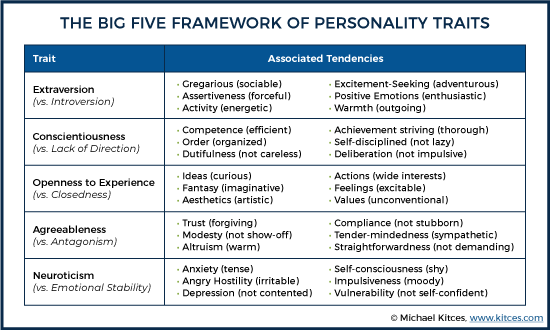
Notably, the purpose of the Big Five is not necessarily to define what are more or less “good” traits, which will vary depending on the situation, but simply to understand the different dimensions across which human personality may vary.
Do The “Big Five” Matter To Financial Planning?
Since the framework was first developed, there has been a breadth of studies applying the Big Five in various contexts. Essentially, like any other demographic characteristic - gender, race, age, etc. - an individual’s Big Five scores reveal something about them and their preferences.
Accordingly, the way people score across the dimensions of the Big Five has been found to be related to everything from academics and achievement, to the ability to adjust, divorce, criminality, and health. For instance, high Conscientiousness can help someone to be driven and focused in their work. High Agreeableness helps individuals to build relationships. Though ironically, high Agreeableness has also been found to contribute to the pay-gap found between men and women, ostensibly because women (who tend to score higher on Agreeableness) may be more likely to steer away from conflict and therefore fail to demand higher pay.
In financial planning research, personality trait studies have largely focused on the clients we serve. For instance, a study by Robinson, Demetre, and Corney in 2010 found that retirement satisfaction is positively related to Conscientiousness and Agreeableness, as conscientious individuals are better able to cope with change, and highly agreeable individuals are able to better build and sustain social networks (important for post-retirement satisfaction). A different study by Nabeshima and Seay in 2015 published in the Journal of Financial Planning found that wealth is positively associated with Extraversion and Conscientiousness. These two factors that have been routinely associated with higher achievement and career success; perhaps not surprisingly, individuals with these high-achievement personality traits, who tend to earn a high-income, also tended to also accumulate greater wealth later in life.
Yet, for all that has been studied on personality and financial planning, very little is known about the personalities of financial planners themselves, and how different personality traits may be shaping the career paths of advisors, and even the practice of financial planning (though Big Five studies are common in other industries to better understand who chooses and succeeds in what career and why!).
How Financial Advisors Stack Up Across The Big Five
When I was in high school, based on my personality, I was either supposed to become a forest ranger or a scientist. Today I work as a researcher. It’s a science-y position, and although I do not roam the woods in isolation, I do work in a remote setting, most often alone (at least if you don’t count my dog). Moreover, if you can remember taking this sort of exam in high school, you may have, at the time, thought the results were funny or odd… and may not have thought of them in terms of accuracy.
However, personality actually has a large hand in everything from career selection to career success. And based on our data from the recent Kitces Financial Planning Process Survey, where, amongst other questions, the respondents answered the TIPI version of the Big Five personality exam developed by Gosling, Rentfrow, and Swann in 2003 – and results show there are a number of unique personality traits associated with choosing to be a (successful) financial planner!
Notably, the sample of Kitces Survey participants (1000+ financial advisors) is both similar and different when compared to industry standards. As a more financial-planning-centric base of advisors, they were more likely to hold the CFP marks (72% compared to 29% of the general financial advisor population), were slightly younger than the typical advisor (average age of 45 compared to the 50-something average of all advisors) and were most likely to be employed in RIAs (66%). Consistent with the general advisor population, though, they were still predominantly male (76%), and mostly white (94%). Thus, although the sample of Kitces Survey Respondents does have some differences relative to the average financial advisor, this information can still provide useful insight into the subset of advisors actively practicing financial planning (henceforth referred to simply as “financial planners”).
It is also important to make a quick note about what will be referred to as general population norms for the Big Five and make a few comments about “norms” in personality studies. General population norms for the TIPI version of the Big Five personality exam were collected via a website, and the 300,000+ responses are available categorized by age and gender. Participants from 241 countries, approximately half of which were Americans, self-selected into taking the TIPI, and as such, it is with caution we use the term “general population norms.” As famously stated by Lewis Goldberg himself, “One should be very wary of using canned 'norms' because it isn’t obvious that one could ever find a population of which one’s present sample is a representative subset. Most norms are misleading, and therefore should not be used.” As such, keep in mind we will be using, for comparative purposes, the “norms” produced from the data averaged across 300,000+ adults – and while this is still not necessarily a perfect representation of “everyone,” hey, we had to start somewhere.
Extraversion Leanings Amongst Financial Planners
The conventional view of financial planning is that, to be successful as an advisor, you must be highly extraverted (in order to find and attract new clients). But our data finds that financial planning is perhaps a profession for everyone, as while financial planners were more extraverted than the general population (scoring 4.19 for men and 4.55 for women, compared to 3.82 and 4.17 respectively in the general population), more than 1/3rd of advisors scored heavily towards introversion instead (affirming statements that lean away from extraversion when describing themselves)!
Yet this conclusion isn’t necessarily surprising, as other research would similarly support that introverts and extraverts, using different but equally important skills, can have equal success. In fact, introverts and their natural tendency to seek out one-on-one relationships may help them to bond with clients even more than extraverts… even if they may have a little more trouble finding those clients in the first place (as prospecting with strangers is more the domain of extraverts). And overall, the number of introverts amongst financial planners may not be substantially different than the general population; Susan Cain, in her research-based book on introversion, found varied reports of extraversion in the general population (between 50% to 70% depending on the source).
Thus, although financial planning has certainly been most often associated with Extraversion – e.g., the outgoing talkativeness that facilitates the process of prospecting and sales – introverts can also be, and apparently are, also making it in financial planning!
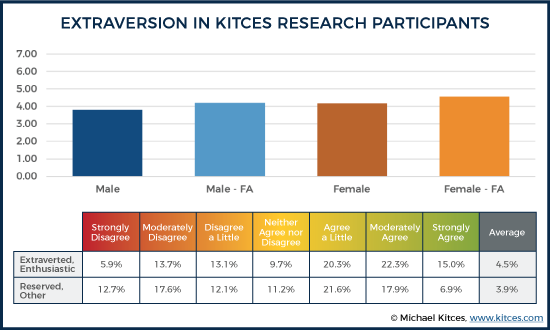
High Conscientiousness Of Financial Planners
Deliberative. Self-disciplined. Competent. Orderly. These are the words we often use to describe professionals, and not surprisingly, professional financial planners scored dramatically higher than the general population norms when looking at Conscientiousness, with an average score of 6.10 for male financial advisors and 6.49 for female financial advisors, compared to general population averages of just 4.93 (male) and 5.13 (female). In fact, again looking at the raw data, nearly 95% of financial advisors agreed, at least a little bit, that they are dependable and organized.
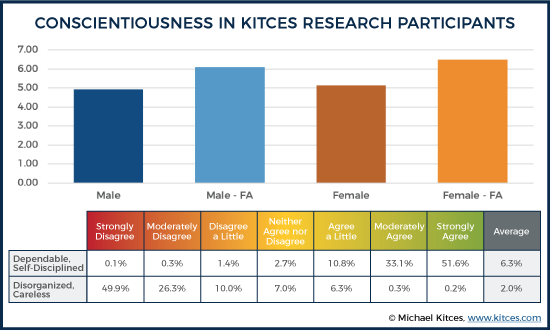
So what might high levels of Conscientiousness mean? Studies have linked Conscientiousness (along with Extraversion) to success in sales roles, and in particular that Conscientiousness is actually what matters most, out of the two traits, for success in business development.
Accordingly, a dramatically higher level of Conscientiousness in financial planners suggests financial advisors are well set up for success if they truly see their role as that of a salesperson and being heavily responsible for business development (and couples well with our above-average extraversion as well). In fact, to the extent that research suggests conscientiousness matters more than extraversion for success in business development, especially high conscientiousness amongst financial advisors may help to success the relatively high success rate of introverts (at least compared to common perceptions of financial advisors as being highly extraverted).
Yet arguably, the analytical nature of financial planning itself is also highly consistent with a conscientious attitude, given the need for financial planners to not just sit down with prospective clients to sell them services but to actually be orderly, disciplined, and competent in taking clients through the financial planning process.
And of course, it is not entirely surprising to find that in an industry where entrepreneurship is encouraged, being organized, having attention to detail, and having high self-motivation (all of which are also all associated with being conscientious), is a trait that in financial planning may help advisors to self-select into success.
Openness (And Conventionalism) In Financial Planners
The Big Five trait of Openness is about one’s interest in new experiences and ideas – it is even sometimes referred to as the “intellect marker” (i.e., intellectual curiosity) in the Big Five. Individuals with this characteristic thrive on new challenges and are usually okay with venturing outside of their comfort zone.
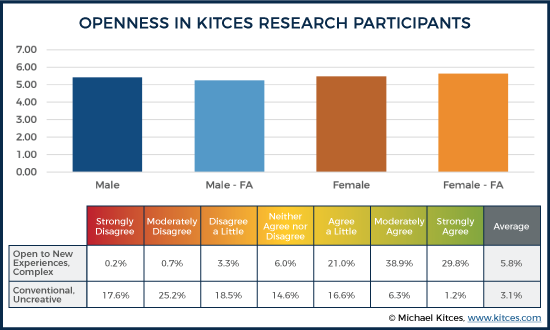
When it comes to financial planners, though, Openness was not too different from the norm. Male financial advisors scored 5.25 and female financial advisors scored 5.63, compared to 5.43 and 5.46 (respectively) in the general population, indicating that males weigh in slightly lower than the general population on openness, while women score only slightly higher.
On the one hand, this may be a bit unexpected – that both men and women didn’t score much higher on openness – given the need to constantly learn and take in a lot of new information to help clients as a financial planner. Yet on the other hand, one of the key value propositions of a financial advisor is often to not help clients engage in “creative” new strategies, but simply to respect and stick to the time-honored traditions of what it takes to accumulate and sustain wealth. Creativity in investing, in particular, is often associated with increased (or even outsized) risk, which financial planners tend to discourage (for good reason)! And especially “creative” financial planners themselves are often seen as compliance risks in large advisory firms!
In fact, when looking at the raw data on Openness amongst financial planners, it is striking that while nearly 90% did report an openness to new experiences (consistent with a highly entrepreneurial industry), the majority of planners also characterized themselves as “conventional” (reducing their overall openness score)… a testament to the fact that while some level of the openness trait may be crucial to be willing to take the leap to start your own advisory firm, financial planners still skew towards the conventional – fitting with how financial planning advice, and “timeless” financial wisdom, is often dispensed!
Agreeableness Of Financial Planners
Agreeable people are not necessarily “Yes” people; instead, it’s better to think of them as “pro-social” or likable. Agreeableness is about working as a team and cooperation, and is also tied to altruism (e.g., doing what is best for the client, not just yourself).
As such, when it comes to the survey results, you may have guessed that financial planners do lean towards being “warm and sympathetic” over “critical and quarrelsome” in their self-assessed agreeableness. Male financial advisors scored an average of 5.21, and female financial advisors scored 5.91, compared to general population males at 4.71 and females at 5.23.
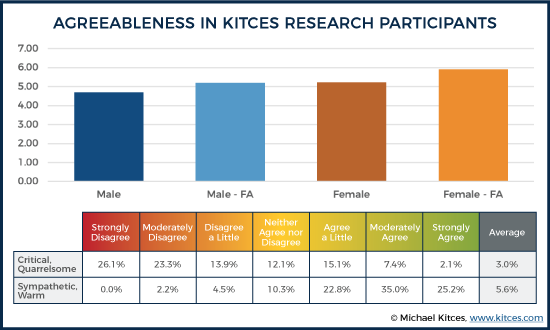
Moreover, Agreeableness for financial advisors is an interesting trait to consider, as while on the one hand it’s clearly important to be “likable” with clients, on the other hand, there will be times when clients do not listen to the planner’s advice, and it becomes necessary to confront them and help hold them accountable to the recommendation they agreed to implement. And confrontation is not always easy if you are an agreeable individual.
In fact, in such situations, the Agreeableness trait will likely steer advisors to work towards being compromising and potentially “too” accommodative of clients, over simply demonstrating or demanding that the client recognizes that s/he is in the wrong and much change his/her behavior.
Yet fortunately, a look at the raw data suggests that financial planners may at least be partially adjusting for this tension. As while a whopping 83% of advisors agreed that they are sympathetic and warm, “only” 63% disagreed about being critical and quarrelsome… suggesting that many advisors have been able to find some balance between being sympathetic to clients, but not too acquiescing when they’re being irrational!
(Lack Of) Neuroticism In Financial Planners
Most people are not overly neurotic. Extreme anxiousness and emotional instability are associated with depression and other serious mental health concerns. Certainly, financial advisors may struggle with these things – recent headlines have documented that everyone from successful athletes to actors struggle with depression – and so advisors are not any less immune to these tendencies as a whole. Nonetheless, it is not surprising that extreme Neuroticism wasn’t common amongst financial planners, as helping clients to control their behaviors likely starts with being able to control one’s own.
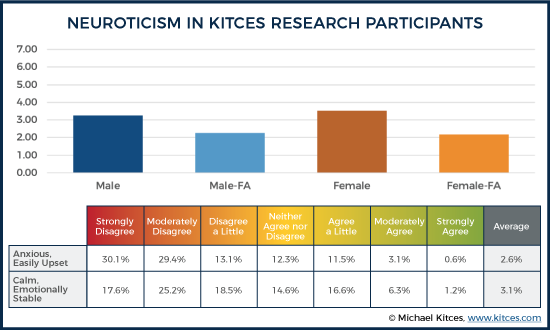
In fact, financial advisors were considerably less neurotic when compared to the general population: male financial advisors scored a 2.27, and female financial advisors scored a 2.17, compared to 3.26 for males and 3.53 for females.
Again, these results should not be entirely shocking, as low Neuroticism is associated with being emotionally stable and calm (rather than anxious or easily upset), which is likely especially important to help clients manage their own behavior and remain calm during times of market volatility. In other words, to the extent that financial planners are seeking to be the emotional anchor that keeps clients moored during difficult times, low Neuroticism is a crucial trait. And that’s exactly what the results show.
The Defining Personality Of A Financial Advisor
Overall, financial advisors are a different breed when we compare them to the general population. As while some of the aforementioned scoring differences on the Big Five may not seem huge, with sample sizes this large, even a difference of 0.1 can be material.
Which means the fact that male and female financial advisors scored, on average, more than an entire point higher on the Conscientiousness scale when compared to the general population (males 6.1 vs. 4.93), is actually a really major deal. The same could be said for Neuroticism, as male and female financial advisors scored on average a whole point lower than general population norms (Males 2.27 vs. 3.26). Financial advisors were also, by and large, more extraverted and agreeable than the average population. In fact, the only trait where financial advisors look similar to the average population is when it comes to Openness… which is perhaps not surprising given the timeless (but conventional) nature of financial wisdom, and the reality that an industry with a high compliance burden would likely tend to drive away those who are “too creative” outside of accepted industry norms.
Moreover, an important point not to be overlooked about the defining personality traits of financial planners is that they are more than just salespeople. As stated above, and in my consulting experience, most financial planners see themselves first as guides, support-givers, and mentors, before they would ever see themselves as salespeople. Yes, they know that sales and business development may be part of their job – even if not selling a product, they sell themselves and their own advice – but I often hear, “I don’t feel like a salesperson,” and many financial planners even find that title unfair or demeaning.
And interestingly, there may be some truth to these feelings based on a recent study of financial salespeople working in large financial services organizations by Lilford, Vigar-Ellis, and Nel in 2014 (that used the same 10-item TIPI scale). Their study documented the average Big Five traits of financial salespeople in particular and showed some meaningful differences between financial salespeople and financial planners.
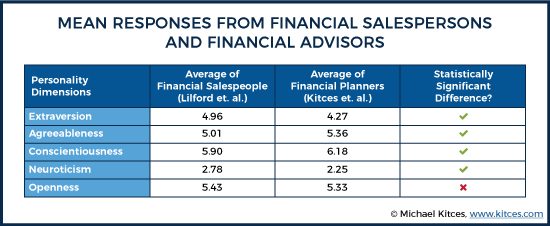
Comparing their data to ours, financial planners and financial salespeople are not the same. Financial planning is not a high-stakes, high-pressure sales job full of loud, excitable (and potentially pushy?) people. In fact, based on the personalities profiled here, it is the exact opposite. Financial planners are less extraverted (one-to-many prospecting) and more introverted (one-to-one client relationships), and show a tendency towards an orderly and calming process-driven approach (high conscientiousness) that sustains over the course of a relationship (rather than just a single transaction). True financial planners are not just salespeople… and literally have a different personality type to show for it!
Identifying (Or Becoming) The Financial Planner Of The Future
Our results suggest that personality is related to not only becoming a financial planner but the approach and success of the financial planner. As such, if you don’t know how you score on the Big Five personality traits, stop and take an assessment to find out. The TIPI, used in the Kitces Survey, can be taken in less than 10 minutes, and it can provide you with a wealth of information!
And again, this information matters, because personality does indeed impact financial planning, and it does so in fairly nuanced ways. There are deal-breakers, success-predictors, and indications of financial planning style-trends – but first, you need to know where you stand on the personality trait spectrum.
The Deal-Breakers
The three traits likely to weed out individuals from either ever becoming, or remaining, a financial planner are: low Conscientiousness, low Agreeableness, and high (maybe even normal) levels of Neuroticism.
If you are more emotional, even to the extent of just being “as emotional as anyone else” (in the general population), you are not crazy… but financial planning might not be as good of a fit for you. After all, would you really want an advisor that may be just as nervous as you in a volatile market cycle? Probably not! Financial advisors must be calm, collected individuals able to deal with everyone else (who, on average, are at least a little more on the emotion or unstable side!). Moreover, this finding really speaks to the notion that financial advisors really are there to help keep clients from diving off of the ledge (in a way that a robo-advisors cannot?), and the personality trait is already very strongly self-selected in the financial planner community.
From the get-go, financial planners must also have high levels of Conscientiousness, as it would be difficult to even pass the entry examinations, must less remain self-disciplined in what can be fairly unstructured, self-monitored environments. Thus, if you are low on Conscientiousness, neither the environment nor the (often highly-detailed) job itself will be not likely be something you enjoy nor are naturally inclined for success in. Perhaps try something else that does fit your talents; there are plenty of other options.
Finally, disagreeable and quarrelsome won’t work in financial planning. While it is important from time to time to “take a stand” and hold a client accountable for his/her problematic behavior, financial planners cannot be commanding, stubborn, or show a lack of sympathy for clients… and expect to stay employed very long. Instead, financial advisors are highly Agreeable individuals. As such, it will be a rewarding career for you if you are agreeable… at least, as long as you’re not too Agreeable. I have worked with a number of financial advisors who, because they were so agreeable, said “yes” to every single client request and found themselves doing too many random one-off tasks to ever feel very organized…which in turn likely lives in deep conflict with their high Conscientiousness, leaving them stressed and on the verge of burn-out. Thus, notwithstanding the Agreeable nature of financial planners… assertiveness training can be very helpful for those who struggle with the occasional necessity of client confrontation (or just simply better learning to say “no”).
The Success-Predictors
If it isn’t clear yet, we are going to mention it again – Conscientiousness matters a lot for a successful career in financial planning, and it matters for a number of reasons.
But in relation to financial success, in particular, conscientiousness matters the most. Conscientious individuals are focused, hard-working and organized – all good thing if you plan to take and pass the CFP education requirements and testing, of which 76% of the financial advisors in our study had done. But it is also no coincidence that the highest-earning advisors were statistically significantly more conscientious even when compared to all the other advisors (not in the top 25% of earnings). Other studies have also found that this character trait is associated with success and high income.

Long story short, financial planning is still a long grind, which means hard work does pay off… but it takes a high level of Conscientiousness as the key trait to help you get there!
The Style-Trends
The style or approach a planner takes to financial planning is also related to personality. More conscientious advisors prefer more detailed financial planning software. More extraverted financial advisors prefer presenting financial plans in collaborative meetings.
Interestingly, one style-trend that did not matter was compensation model. We had thought that a commission framework may be more geared toward those sales traits – Extraversion and Conscientiousness. Whereas fees may be more geared toward those individuals who consider financial planning as a helping profession. However, there were no significant differences when looking at personality and compensation structure across those earning hourly fees, retainer fees, AUM fees, or mixtures of AUM fees and commissions.
So let these trends be your guide; if you know you enjoy talking with clients and find yourself more engaged when you can work with the client through a problem, then taking a collaborative approach to financial planning makes sense. Conversely, if completing a plan on the fly or too much back and forth with clients seems draining, consider a custom or comprehensive approach. In these approaches, you can complete your work, feel prepared, and present without getting overwhelmed or lost in the back and forth. Changes can certainly still be made to the plan but presenting it one time through, without immediate feedback, may be more comfortable for you and help you to succeed with clients.
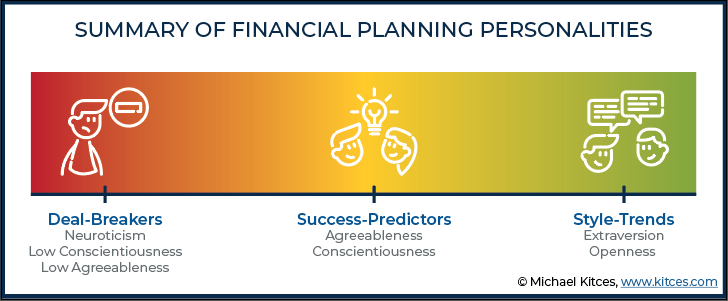
When Choosing A New Financial Planner (Or Considering Whether To Become One)
The traditional view of financial advisors is that the key ingredient to success is extraversion, and the ability to find and meet prospective clients to do business with. Yet in practice, it turns out that the defining characteristics of being a successful financial planner are much more nuanced… and that in the long-term, it’s conscientiousness and agreeableness that are more predictive of staying power and financial success than extraversion versus introversion alone. And across the board, “low neuroticism” and the ability to really be the client’s emotional anchor in the storm, is perhaps the key (and underappreciated?) differentiator of what makes financial planners different than salespeople.
Of course, the reality is that even (or perhaps especially) with broad-based statistics about a wide number of people, there will be exceptions to the rule, and these results don’t unequivocally mean that someone who isn’t as high on conscientiousness or as low on neuroticism “can’t” succeed. Nonetheless, for those traits in particular, the ways they are reflected in the population of financial planners – being so different than salespeople and especially the general population – suggests that perhaps they should actually be evaluated in the hiring process of new financial planners (or duly self-evaluated by those considering a financial planning career).
On the other hand, the reality is that while personality traits are by definition relatively stable characteristics of an individual person, they are not totally immutable. Those struggling with “too high” Agreeableness may still better balance their need to hold clients accountable by taking assertiveness classes. Introverts struggling with business development could try Toastmasters or Improv training to improve their ability to think on their feet in unexpected or unplanned scenarios.
In other words, your results on the Big Five should not pigeon-hole you, and research is increasingly finding that personalities are in some ways more fluid than once believed. In fact, some of our own results in this research suggested that as advisors age… their personalities change. Nonetheless, the fact remains that, given our analysis of more than 1,000 financial planners, there are clear and unique personality traits that define what the “typical” financial planner as a truly unique personality type unto itself!




